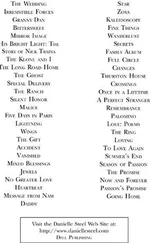Danielle Steel - Echoes
Здесь есть возможность читать онлайн «Danielle Steel - Echoes» весь текст электронной книги совершенно бесплатно (целиком полную версию без сокращений). В некоторых случаях можно слушать аудио, скачать через торрент в формате fb2 и присутствует краткое содержание. Год выпуска: 2005, ISBN: 2005, Издательство: Random House, Inc., Жанр: Старинная литература, на английском языке. Описание произведения, (предисловие) а так же отзывы посетителей доступны на портале библиотеки ЛибКат.
- Название:Echoes
- Автор:
- Издательство:Random House, Inc.
- Жанр:
- Год:2005
- ISBN:9780440240785
- Рейтинг книги:4 / 5. Голосов: 1
-
Избранное:Добавить в избранное
- Отзывы:
-
Ваша оценка:
- 80
- 1
- 2
- 3
- 4
- 5
Echoes: краткое содержание, описание и аннотация
Предлагаем к чтению аннотацию, описание, краткое содержание или предисловие (зависит от того, что написал сам автор книги «Echoes»). Если вы не нашли необходимую информацию о книге — напишите в комментариях, мы постараемся отыскать её.
Echoes — читать онлайн бесплатно полную книгу (весь текст) целиком
Ниже представлен текст книги, разбитый по страницам. Система сохранения места последней прочитанной страницы, позволяет с удобством читать онлайн бесплатно книгу «Echoes», без необходимости каждый раз заново искать на чём Вы остановились. Поставьте закладку, и сможете в любой момент перейти на страницу, на которой закончили чтение.
Интервал:
Закладка:
“It's a beautiful old house. It was originally built in the sixteenth century. And rebuilt about two hundred years later. I'm afraid it's badly in need of repair these days. There will be no one to do it until the war is over. The roof leaks like a sieve.” He smiled. He was looking at her as though there was something familiar about her too. She knew what it was, she was the image of her father. She wondered what would happen if she told him the truth. But things must have changed, if he was hiding Jewish children. It seemed the ultimate irony now, since her father had been banished and never seen again by any of them because he had a Jewish wife.
They finished dinner, and the count invited her to walk in the gardens. He said they had been done by the same architect who had designed the gardens at Versailles. It was a strange feeling walking through the same halls and rooms and places where her father had lived as a boy, and as she walked outside, the thought of it brought tears to her eyes. These same rooms had been filled with the sounds of his voice and laughter as a child and as a young man. They were the echoes of her past, which she shared with these two men, although they didn't know it.
“Are you all right?” Armand could see that she was deeply moved by something. His father was already waiting for them in the garden. She nodded as they went outside, and he showed them around.
“You're a very brave woman to bring those children down on your own. If I had a daughter, I'm not sure I would let her do that. In fact, I'm sure I wouldn't.” He looked at Armand then, frowned, and lowered his voice. “I worry about Armand as well. But none of us has any other choice these days, do we?” In fact they did. There were others who made different choices. She liked the one she was making, and theirs.
As they walked around through the once-beautiful gardens, the count asked her nothing about herself. They were all better off not knowing too much. Everyone was careful these days. It was dangerous to say too much to anyone. But as she sat down on one of the ancient time-worn marble benches that had been rubbed smooth by the elements, she looked up at him with sad eyes.
“I don't know why,” he said gently, “but I have the feeling I know you, that we've met somewhere.” There was no one around but Armand. “Have I?” He was in his late fifties, she knew, and not old enough to be senile. But he looked confused, as though he heard voices from another time, and wasn't sure what he was hearing, or seeing. “Have we met?” he asked her again. He didn't think it likely, but he might have forgotten. And as she sat there, looking at him, she looked remarkably like Armand.
“You knew my father,” she said in a gentle voice, never leaving his eyes with her own.
“Did I? What was his name?”
“Antoine de Vallerand,” she said calmly. Nicolas was his brother, and her uncle, and Armand her first cousin. There was absolute silence between the three of them for an endless moment, and then without saying a word, tears began to roll down his cheeks, and he took her in his arms.
“Oh my dear…oh my dear …” He couldn't say anything else for long minutes. He was overwhelmed by the memories she had brought with her. “Did you know when you came here?” He wondered if that was why she had taken the mission. But she hadn't known.
She shook her head. “Not until we drove in here, and Armand said your name. It was a bit of a shock, as you can imagine.” She laughed through her own tears. “I wanted to say something at dinner, but I was afraid you'd ask me to leave. I wanted to savor it for a little while. My father always talked to me about all this, the place where he grew up.”
“I never forgave my father for what he did. I hated him for it, and myself, for not having the courage to defy him. We were barely civil to each other after that. And when he died, I wanted to ask your father to come home and forgive us. He died two weeks later. And my wife died the year after. I wanted to write to your mother about how I felt about what happened, but I never knew her, and I felt sure she hated all of us.” Instead, he had written a proper letter of condolence, and nothing more.
“She didn't hate you,” Amadea reassured him. “Her family was even worse to her. They wrote her name in the family's book of the dead, and wouldn't let her see her mother when she died, or go to the funeral. My grandmother had come to us two years before, and we got to know her. I never met the others.”
“Where are they now?” he asked, looking concerned, as Amadea took a breath before she answered. The rest was all bad news.
“The entire family was deported on Kristallnacht. Some people thought they were sent to Dachau, but I don't know for sure. My mother and sister were deported to Ravensbrück two years ago. I haven't heard from them since.” He looked horrified by what she had said.
“And you came here?” He looked confused as Armand watched her intently. She was an amazing woman. Armand had no sisters, and wished he had one like her. He was an only child, with no relatives other than his father. They had made the decision to join the Resistance together, all they had in the world was each other, and this house, which was in a genteel state of disrepair as was the property all around them.
“I was in Theresienstadt for five months. Friends hid me before that, after my mother was deported. I was in a Carmelite convent for six years before that.”
“You were a nun?” Armand looked shocked.
“I still am, I suppose,” although that had been questionable for a while. But she was sure again now. Ever since Jean-Yves died. She had found her vocation again. She wasn't sure now that she had ever lost it. She had just taken a brief detour, in extraordinary circumstances. “Sister Teresa of Carmel. I'll go back after the war. I had to leave the convent so as not to endanger the others.”
“What a remarkable girl you are,” her uncle said, putting an arm around her shoulders. “Your father would be very proud of you, if he were alive. I am, and I hardly know you.” And then he looked at her wistfully. “Could you stay longer?” They had a lifetime of catching up to do. And he wanted to hear all about the years he had lost with his brother. There were a thousand things he wanted to know.
“I don't think that would be wise,” she said sensibly, showing Carmelite good judgment, as Serge would have said. “I'd like to come back, if I may,” she asked politely. He could see that she was beautifully brought up.
“I'd be heartbroken if you didn't.” They walked back inside then, and spent the rest of the night talking. They never went to bed, and then finally she went to lie down for a few hours before she left.
She went to kiss the children good-bye, and they cried when she left them. And she, Armand, and Nicolas all cried as she drove away. She had promised to come back, and her uncle had begged her to be careful and take care of herself. She could still see them in the rearview mirror, standing in the courtyard, waving, as she turned and they disappeared out of sight. It had been one of the best nights of her life, and she wished that Jean-Yves and her father could have been there. But as she drove back to Melun, she felt them close to her, along with her mother and Daphne. They were all part of an unbreakable chain, linking the present, the future, and the past.
22
AMADEA'S DRIVE BACK TO MELUN WENT SMOOTHLY. SHE was stopped by soldiers only once, and although they admired her and chatted for a few minutes, they let her drive on fairly quickly. They had scarcely glanced at her papers. One of them waved with a big boyish grin as she drove off.
She was back in Melun at the farmhouse by late afternoon. By the following week, she was back with the others, picking up supplies parachuted in, and following their familiar routine. The British had sent them two more shortwave radios, which were concealed at neighboring farms.
Читать дальшеИнтервал:
Закладка:
Похожие книги на «Echoes»
Представляем Вашему вниманию похожие книги на «Echoes» списком для выбора. Мы отобрали схожую по названию и смыслу литературу в надежде предоставить читателям больше вариантов отыскать новые, интересные, ещё непрочитанные произведения.
Обсуждение, отзывы о книге «Echoes» и просто собственные мнения читателей. Оставьте ваши комментарии, напишите, что Вы думаете о произведении, его смысле или главных героях. Укажите что конкретно понравилось, а что нет, и почему Вы так считаете.











